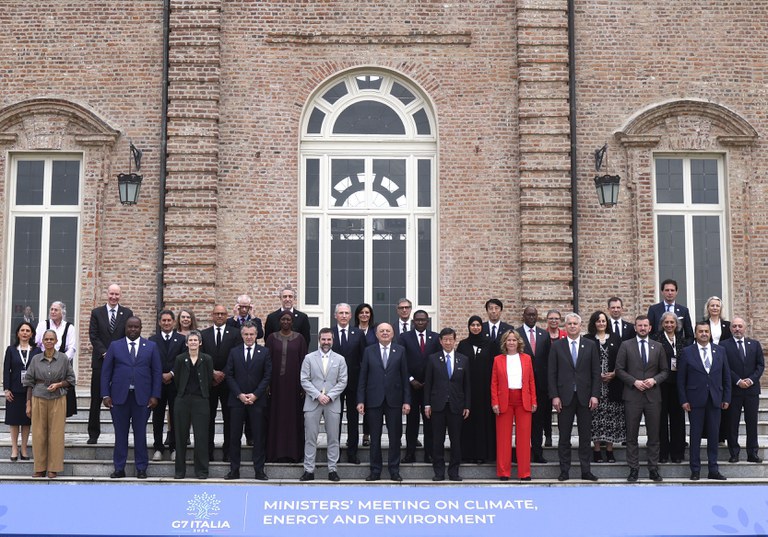Notícias
INTERNATIONAL
At the G7 meeting, Marina urged more climate action from developed countries and financing

Family portrait of the G7 Climate, Energy, and the Environment ministerial meeting. Photo: MMA
Environment Minister Marina Silva advocated last Monday (29 April) in Turim, Italy, for more climate action from the G7 countries and more financing for energy transformation in developing nations. Marina attended the group’s ministerial meeting on Climate, Energy, and the Environment, where seven of the world’s most industrialized countries gathered.
"The responsibility of the major economies represented at the G7 goes far beyond reducing emissions in their own territories. Besides reducing their own emissions, they must have a key role in decarbonization, by mobilizing public and private, national and international resources to strengthen developing countries’ capabilities," declared the Minister at the meeting.
>> Read the full statement (available in Portuguese)
>> Access high-resolution photos.
Under Italy’s rotating presidency in 2024, the G7 is also composed of Germany, Canada, the United States, France, Japan and the United Kingdom. Invited to attend the ministerial meeting, Brazil presides over the G20 in 2024 and is charged with organizing the 2025 COP30 in Belém (PA).
Advanced economies, Marina stated, already have market mechanisms in place to boost the energy transition. For most developing countries, however, these instruments either “do not exist or are completely fragile".
Marina urged G7 support for the G20 and COPs 29 and 30 to ensure the availability of financing and implementation means for developing countries. The goal is to increase these nations’ capabilities to implement ambitious climate goals for mitigation and adaptation.
The minister listed three areas where the G7 can provide support:
- Enabling the new global collective climate financing target at COP29 in Baku to help restore confidence in the multilateral climate regime.
- Strengthening multilateral banks by effectively disbursing funds for mitigation and adaptation efforts, advancing the global governance reform process.
- Developing, before COP30, Nationally Determined Contributions (NDCs) aligned with the Emirates Consensus decision to transition away from fossil fuels and push forward the emissions neutralization target well before 2050.
"Ambition and means of implementation are inseparable. We need to commit to ambitious NDCs aligned with the 1.5 °C Mission and with the means of implementation, to make them a reality," declared the minister.
The 1.5 °C Mission is a global effort created in 2023 during COP28, in Dubai, in the United Arab Emirates, to limit global warming to 1.5 °C in relation to pre-industrial levels. The Emirates Consensus also created a troika to implement the mission, composed of the presidencies of COP28, COP29, and COP30.
The Brazilian delegation in Turim included the MMA national secretary for Climate Change, Ana Toni, and the secretary for Climate, Energy, and the Environment of the Ministry of Foreign Affairs (MRE), André Corrêa do Lago.
Coordinated effort
According to Marina, a coordinated effort by the G7, the G20, and the UN Climate Convention is "key to overcoming the climate change crisis". The global mobilizations to combat climate change and poverty are a priority for President Lula and Brazil’s G20 Presidency.
The G20 is responsible for more than 80% of global greenhouse gas emissions and concentrates over 80% of financial resources. The G7, on the other hand, has 10% of the world population but accounts for one-fourth of the energy sector emissions.
"In Brazil, we are tackling our major source of emissions decisively: in one year, we reduced deforestation in the Amazon, which prevented the emission of roughly 250 million tons of CO2. However, our efforts will be to no avail if the world’s major polluters do not reduce their greenhouse gas emissions", the minister said at the G7.
Marina also participated in bilateral meetings this Monday with Amna al Shamsi, the United Arab Emirates’s minister for Climate Change and the Environment; Wopke Hoestra, European Union commissioner for Climate Action; Steffi Lemke, Germany’s minister for the Environment, Natural Conservation and Nuclear Security; Christophe Bechu, France’s minister of Ecologic Transition and Territorial Cohesion; and Virginijus Sinkevičius, European Union commissioner for the Environment, Oceans and Fisheries.
On Sunday, the minister Marina participated in the Sustainable Biofuels International Forum organized by the G7 together with the International Energy Agency. During the meeting, she highlighted the Brazilian Government’s commitment to using sustainable biofuels to accelerate the energy transition. She also had bilateral meetings with the ministers of the Environment of Italy, Gilberto Pichetto; Japan, Shintaro Ito; Canada, Steven Guillbeault; and Faith Birol, executive director at the International Energy Agency.
Last week, in Berlin, Marina joined the Petersberg Climate Dialogue, a preparatory meeting for climate negotiations. During the event, which was part of the climate troika’s activities, she advocated that the world must accelerate its energy transition to combat the climate emergency and promote sustainable development.
In Germany, Marina had bilateral meetings with John Podesta, the United States’ Special Presidential Envoy for Climate; Stéphane Sejourné, France’s Minister of Foreign Affairs; and Annalena Baerbock, Germany’s Minister of Foreign Affairs. She also met with the president of COP29, Mukhtar Babayev; the Spanish Minister of Ecological Transition, Teresa Ribera; the executive secretary of the United Nations Framework Convention on Climate Change (UNFCCC), Simon Stiell; and the UNFCCC’s former executive secretary and former chancellor of Mexico, Patricia Espinosa[1] .
Source: MMA Communications Advisory
imprensa@mma.gov.br
(61) 2028-1227/1051